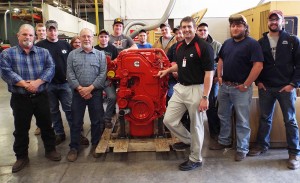A 15-liter engine donated by Cummins Inc., which will enable hands-on troubleshooting by students, has been added to the industry-standard instructional equipment in Pennsylvania College of Technology’s diesel laboratories.
The 2010 ISX15 engine was recently delivered to the Schneebeli Earth Science Center by Cummins Inc. representative Shawn M. Hricko for use by students of David C. Johnson, instructor of diesel equipment technology.
“We are so fortunate to have received a donation of this caliber from Cummins,” said Mary A. Sullivan, executive director of the ESC and assistant dean of transportation and natural resources technologies. “This is not just an engine, but an entire system that will be incorporated into our advanced fuels labs.”
 Instructor William P. Kilcoyne Jr. helped arrange the donation, which will acquaint students with the technological complexity required to meet U.S. Environmental Protection Agency emissions standards.
Instructor William P. Kilcoyne Jr. helped arrange the donation, which will acquaint students with the technological complexity required to meet U.S. Environmental Protection Agency emissions standards.
“The cost of equipment, parts, tooling and the need to stay current by continually updating the engines and their technologies can be overwhelming,” he noted. “Partnerships with companies and organizations like Cummins allow us to do what we do best: train and prepare these young men and women for successful careers in the diesel field.”
“In addition to the donation, Shawn did a classroom presentation for many of our diesel students, detailing where the industry is going with the new emissions standards,” Sullivan said. “This level of technology is critical for our students as they enter the workforce of the future.”
 The EPA-certified model can produce up to 500 horsepower and 1,850 pound-feet of torque and weighs 3,000 pounds, said Hricko, ISX12/15 performance assistant chief engineer at the manufacturer’s Jamestown, N.Y., location. It includes new technologies such as high-pressure, common rail fuel injection; a variable-geometry turbocharger with exhaust gas recirculation; a diesel particulate filter; and a selective catalytic reduction system to meet the near-zero engine emissions.
The EPA-certified model can produce up to 500 horsepower and 1,850 pound-feet of torque and weighs 3,000 pounds, said Hricko, ISX12/15 performance assistant chief engineer at the manufacturer’s Jamestown, N.Y., location. It includes new technologies such as high-pressure, common rail fuel injection; a variable-geometry turbocharger with exhaust gas recirculation; a diesel particulate filter; and a selective catalytic reduction system to meet the near-zero engine emissions.
“Cummins is one of the biggest players in diesel engine emissions control. The old days of black-smoke-bellowing diesel engines are gone,” Kilcoyne said. “Due to increasing emission standards for diesel engines, the engines of today are modern marvels that have great durability, provide an increase in fuel economy and emit lower levels of emission gases than ever before.”
The donation continues the college’s longtime partnership with Cummins Inc., which is represented on the Diesel Technology Advisory Committee that helps ensure that curriculum reflects workforce needs.
“It is important to Cummins Inc. to be involved in the community and the industry,” Hricko said. “Penn College is a great mutual relationship to Cummins. I look forward to continuing the relationship and leveraging it in the future.”
The School of Transportation & Natural Resources Technologies offers associate degrees in diesel technology and on-site power generation, as well as a certificate in diesel technician. For more information, call 570-327-4516.
For information about Penn College, which is observing its Centennial throughout 2014, email the Admissions Office or call toll-free 800-367-9222.
The 2010 ISX15 engine was recently delivered to the Schneebeli Earth Science Center by Cummins Inc. representative Shawn M. Hricko for use by students of David C. Johnson, instructor of diesel equipment technology.
“We are so fortunate to have received a donation of this caliber from Cummins,” said Mary A. Sullivan, executive director of the ESC and assistant dean of transportation and natural resources technologies. “This is not just an engine, but an entire system that will be incorporated into our advanced fuels labs.”
 Instructor William P. Kilcoyne Jr. helped arrange the donation, which will acquaint students with the technological complexity required to meet U.S. Environmental Protection Agency emissions standards.
Instructor William P. Kilcoyne Jr. helped arrange the donation, which will acquaint students with the technological complexity required to meet U.S. Environmental Protection Agency emissions standards.“The cost of equipment, parts, tooling and the need to stay current by continually updating the engines and their technologies can be overwhelming,” he noted. “Partnerships with companies and organizations like Cummins allow us to do what we do best: train and prepare these young men and women for successful careers in the diesel field.”
“In addition to the donation, Shawn did a classroom presentation for many of our diesel students, detailing where the industry is going with the new emissions standards,” Sullivan said. “This level of technology is critical for our students as they enter the workforce of the future.”
 The EPA-certified model can produce up to 500 horsepower and 1,850 pound-feet of torque and weighs 3,000 pounds, said Hricko, ISX12/15 performance assistant chief engineer at the manufacturer’s Jamestown, N.Y., location. It includes new technologies such as high-pressure, common rail fuel injection; a variable-geometry turbocharger with exhaust gas recirculation; a diesel particulate filter; and a selective catalytic reduction system to meet the near-zero engine emissions.
The EPA-certified model can produce up to 500 horsepower and 1,850 pound-feet of torque and weighs 3,000 pounds, said Hricko, ISX12/15 performance assistant chief engineer at the manufacturer’s Jamestown, N.Y., location. It includes new technologies such as high-pressure, common rail fuel injection; a variable-geometry turbocharger with exhaust gas recirculation; a diesel particulate filter; and a selective catalytic reduction system to meet the near-zero engine emissions.“Cummins is one of the biggest players in diesel engine emissions control. The old days of black-smoke-bellowing diesel engines are gone,” Kilcoyne said. “Due to increasing emission standards for diesel engines, the engines of today are modern marvels that have great durability, provide an increase in fuel economy and emit lower levels of emission gases than ever before.”
The donation continues the college’s longtime partnership with Cummins Inc., which is represented on the Diesel Technology Advisory Committee that helps ensure that curriculum reflects workforce needs.
“It is important to Cummins Inc. to be involved in the community and the industry,” Hricko said. “Penn College is a great mutual relationship to Cummins. I look forward to continuing the relationship and leveraging it in the future.”
The School of Transportation & Natural Resources Technologies offers associate degrees in diesel technology and on-site power generation, as well as a certificate in diesel technician. For more information, call 570-327-4516.
For information about Penn College, which is observing its Centennial throughout 2014, email the Admissions Office or call toll-free 800-367-9222.
Photos by Pamela A. Mix, secretary to the ESC executive director and assistant dean of transportation and natural resources technologies
